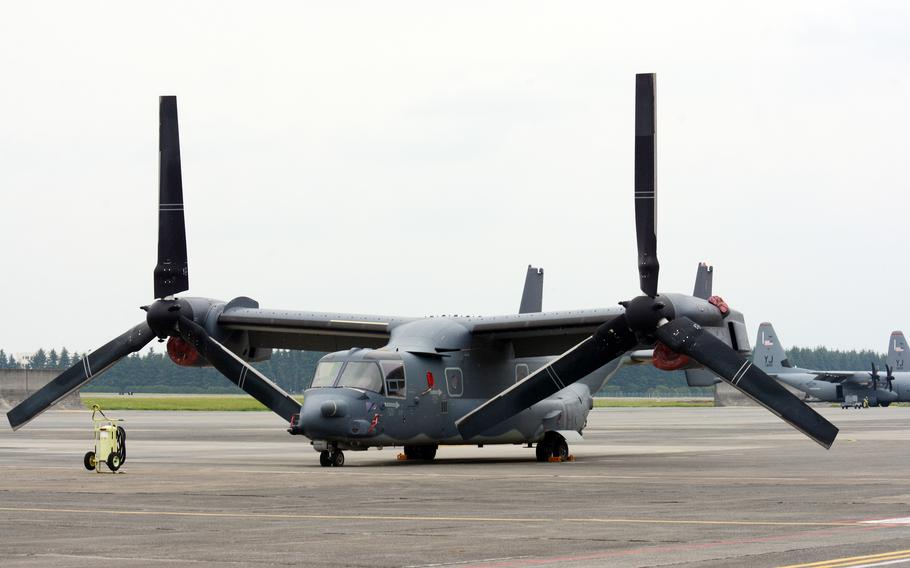
An Air Force Special Operations Command CV-22B Osprey parks at Yokota Air Base, Japan in 2018. (Stars and Stripes)
YOKOTA AIR BASE, Japan — Ospreys will continue to fly in Japan, the Pentagon said, as search-and-rescue efforts entered a third day for an Air Force tiltrotor that crashed near an island in Kagoshima prefecture.
The CV-22B, assigned to the 353rd Special Operations Wing at Yokota, was on a routine training mission when it went down off Yakushima on Wednesday afternoon, according to Air Force Special Operations Command.
One of the Osprey’s eight crewmembers — recovered unconscious soon after the crash alongside an empty 20-person life raft and aircraft wreckage — has been confirmed dead, a Kyushu-based spokesman for Japan’s Ministry of Defense said Thursday. The body was returned to the U.S. military that afternoon, according to Japan’s 10th Regional Coast Guard Headquarters.
The Japan Ground Self-Defense Force has grounded its fleet of 14 Ospreys, Chief Cabinet Secretary Hirokazu Matsuno told reporters Thursday. Tokyo has asked the U.S. military to confirm that all its tiltrotors are safe before flying them in Japan, he said.
U.S. Ospreys are still operating in Japan, Pentagon spokesperson Sabrina Singh told reporters at a news briefing Thursday in Washington.
“Right now, our focus on what just happened earlier this week remains on search-and-rescue efforts,” she said. “It’s currently under investigation to see exactly what happened.”
Asked if the Defense Department has concerns about the Ospreys, Singh said she would not get ahead of the investigation.
“If the investigation concludes that there needs to be additional steps taken, we’ll certainly do that, but at this time the investigation is underway on what happened,” she said.
Singh couldn’t provide a significant update on the multiday search, which so far has included vessels and aircraft from the U.S. military, Japan Self-Defense Forces and Japanese coast guard.
“The search and recovery efforts are ongoing,” she said. “I hope we will have more information to share soon, but at this moment I just don’t.”
Japanese Defense Minister Minoru Kihara said he met with the commander of U.S. Forces Japan, Air Force Lt. Gen. Ricky Rupp, Thursday afternoon at the ministry’s Tokyo headquarters.
“Given that Ospreys continued flights at Marine Corps Air Station Futenma, I once again requested him to provide specific information on the measure that U.S. forces are currently taking and plan to take in order to ensure flight safety,” Kihara said at a news conference after their meeting.
Kihara said he told Rupp that saving lives is Japan’s highest priority and they will continue to put strong effort into the search-and-rescue operation.
USFJ did not immediately respond Friday to emails and phone calls requesting comment about the meeting.
Matsuno, speaking at a news conference Friday, said Tokyo will continue to urge the U.S. to take measure to ensure safety.
“We have concerns that they are conducting flights when sufficient explanation on flight safety confirmation has not been given to the Japanese government, although we have been making similar requests,” he said.
Japan’s coast guard confirmed in a news release Friday morning that those efforts are moving forward with vessels, aircraft and teams from multiple agencies, though not much progress has been made so far.
Searches using side-scan sonar have captured unusual echo images of the seafloor, the coast guard said both Thursday and Friday, but dives made on both those days offered no clues about the missing crewmembers.
Yokota, which has hosted CV-22 Ospreys since 2018, has established an emergency family assistance center to support anyone affected by the crash. People can go to the Military and Family Readiness Center to receive 24-7 “counseling, assistance and available information” from representatives from the base chapel, mental health, public affairs and other support agencies, the 374th Airlift Wing announced Thursday evening on Facebook.
Stars and Stripes reporter Matthew Adams contributed to this report.